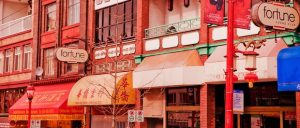On September 19th, 2017, Yulanda Lui sent an open letter to the organizers of Babes on Babes, a nightlife event targeted towards Vancouver’s queer community featuring “a collective of artists, DJs, and promoters with the desire to showcase and celebrate local and international Queer talent” (Lui, 2017). In this letter, Lui had expressed her desire to attend the party, but explained that she was unable to due to being unsettled by the location that Babes on Babes decided to host their event at, that being Fortune Sound Club, located on East Pender Street in Vancouver’s Chinatown (Lui, 2017). This is a neighborhood that, according to a 2006 census, has a median income just over a third of the income of the city as a whole, and is facing rapid gentrification that pushes out its residents, many of whom are low-income Chinese immigrants and elders (Givetash, 2016). Fortune Sound Club does not serve the needs of the community surrounding them, and instead attracts and profits off of a more affluent demographic that does not necessarily face the same barriers to maintaining a livelihood as the residents who call that place home. Lui’s open letter explaining her refusal to attend the event is her direct attempt to make Babes on Babes aware that their choice to support and work with businesses like Fortune Sound Club makes them complicit in the gentrification of Chinatown, and also gave them an opportunity to own up to how their actions are harmful to the local community (Lui, 2017).

It is important and telling to note that even after Lui communicated with Babes on Babes’ event organizers the event happened anyways, and continues to be hosted at Fortune Sound Club. Babes on Babes’ role in the gentrification of Chinatown is easily comparable to the figure of the Queer Gentrifier as discussed by Bacchetta, El-Tayeb, and Haritaworn in “Queer of Colour Formations and Translocal Spaces in Europe.” (2015). Described as enterprising “pioneers”, Queer Gentrifiers establish their creative spaces in pre-existing homes of residents who usually do not have an equal access to racial and class privileges (Bacchetta et. al, 2015). The non-intersectional methods used to create queer space end up excluding others, as seen through members of the creative class that move into low income places and push out the residents in a local neo-colonialist fashion. Lui also writes about Fortune Sound Clubs’ displacement of local business in this same, neo-colonialist fashion, when it replaced Ming’s Chinese Restaurant in 2009 in her letter – this is not only a physical displacement, but also a detriment to the local economy (Lui, 2017). The unequal power dynamics that are used in creating space and simultaneously making space unavailable to others speaks to the importance of making sure one’s “inclusive” activism is actually inclusive and open to improve on criticism in order to respect and do better by their community, rather than just performing their cause.
The Queer Gentrifier model directly highlights the irresponsibility of focusing only on uplifting one community independently from others, and the resulting harm inflicted upon those other oppressed groups. While Babes on Babes likely means well by trying to create a space for marginalized queer folks, and the opportunity to showcase their talents and celebrate their identities is done at the cost of embodying one of the many forces gentrifying Chinatown under the guise of so-called “revitalization”. Bacchetta, El-Tayeb, and Haritaworn’s observation of the pattern of attempting to legitimize racial and colonial violence in the names of protecting, or in this case, making LGBT spaces points to the fact that being oppressed does not give groups permission to oppress others. By choosing to stand for one marginalized group of the backs of others, Queer Gentrifiers also ignores members of the queer community that face other oppressions caused by the multiplicity of their identities. Like Lui, we need to be aware of the politics of the location of our activism, and take a stand to demand for real inclusivity.
Citations:
Lui, Y. (2017). Letter to Babes on Babes by Yulanda. Retrieved from www.facebook.com/events/1944507529207526/.
Givetash, L. (2016, August). Dying neighbourhood’: Vancouver’s Chinatown grapples with affordability, development. Www.thestar.com. Retrieved from www.thestar.com/news/canada/2016/08/20/dying-neighbourhood-vancouvers-chinatown-grapples-with-affordability-development.html.
Bacchetta, P. et al. (2015). Queer of colour formations and translocal spaces in Europe. Environment and Planning D: Society and Space, 33(5), 769–778. doi:10.1177/0263775815608712.
No Title. ThisIsBlueprint.com, http://thisisblueprint.com/wp-content/uploads/2014/05/fortune-sound-club/23490/fortuneexterior-redtint.jpg
[Exterior of Fortune Sound Club in Vancouver’s Chinatown]. (n.d.). Retrieved November 6, 2017, from http://thisisblueprint.com/wp-content/uploads/2014/05/fortune-sound-club/23490/fortuneexterior-redtint.jpg